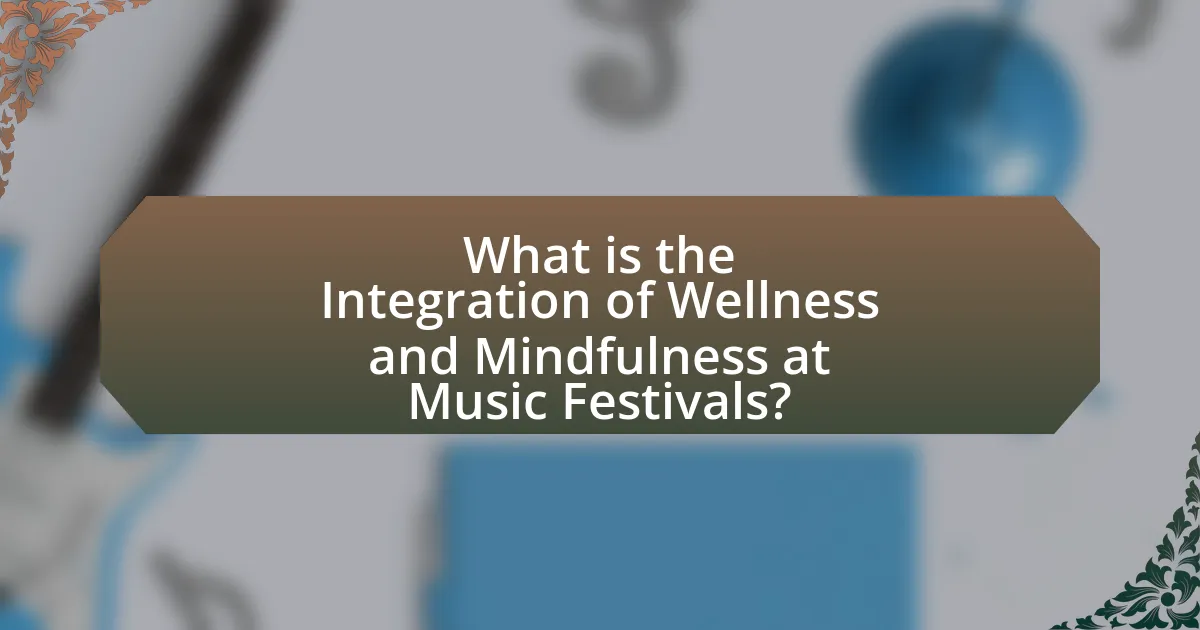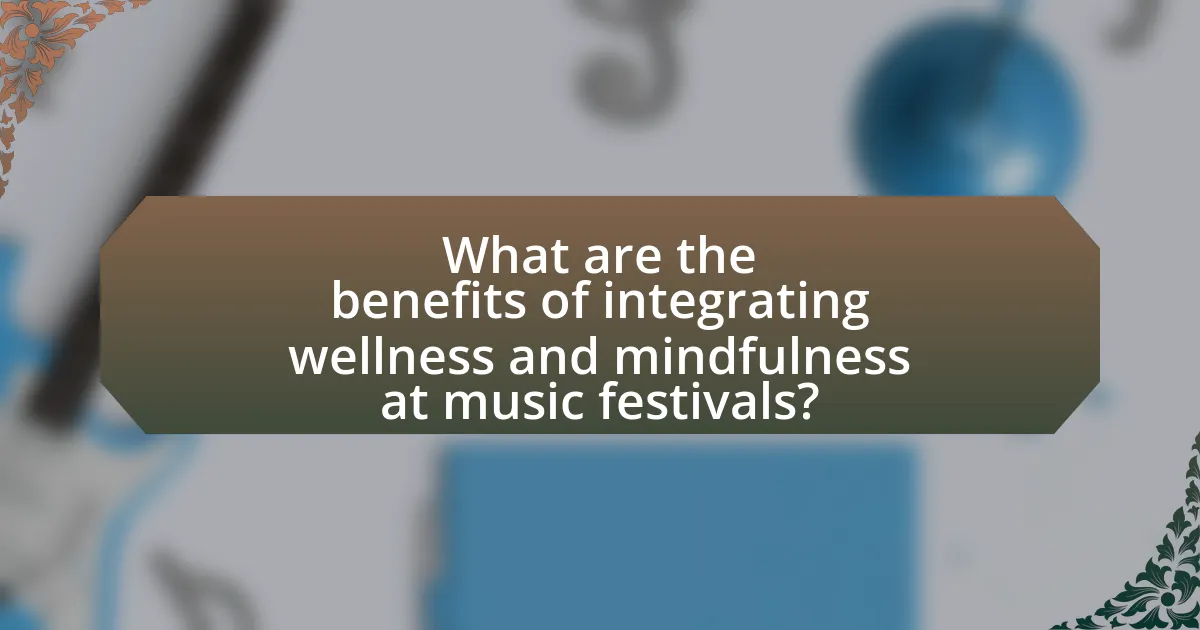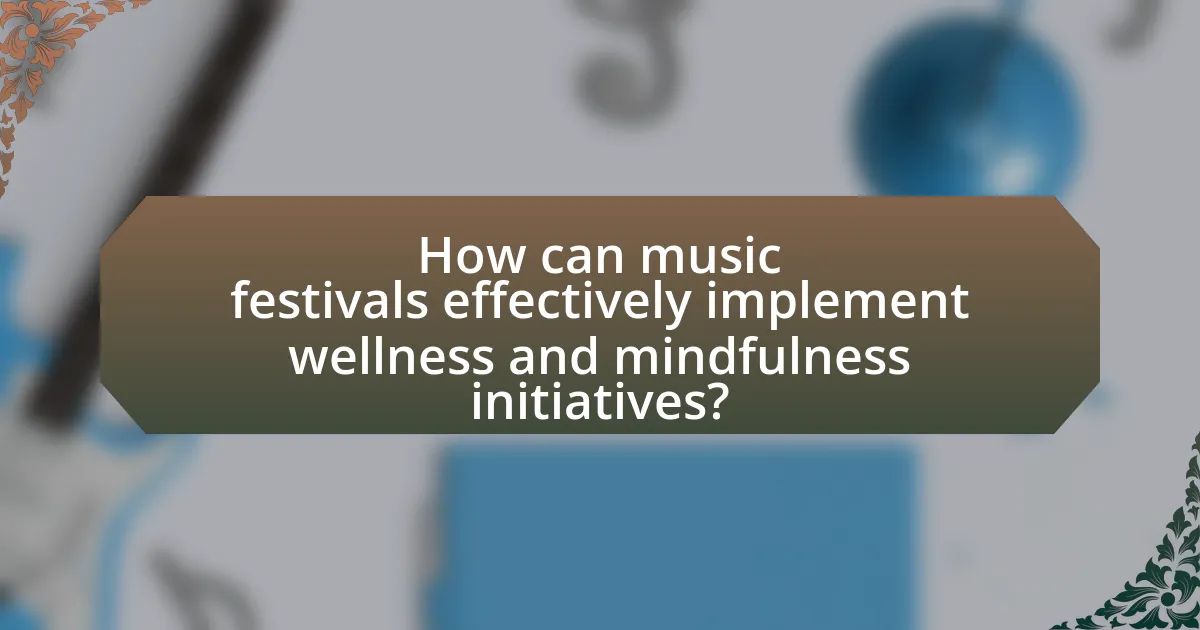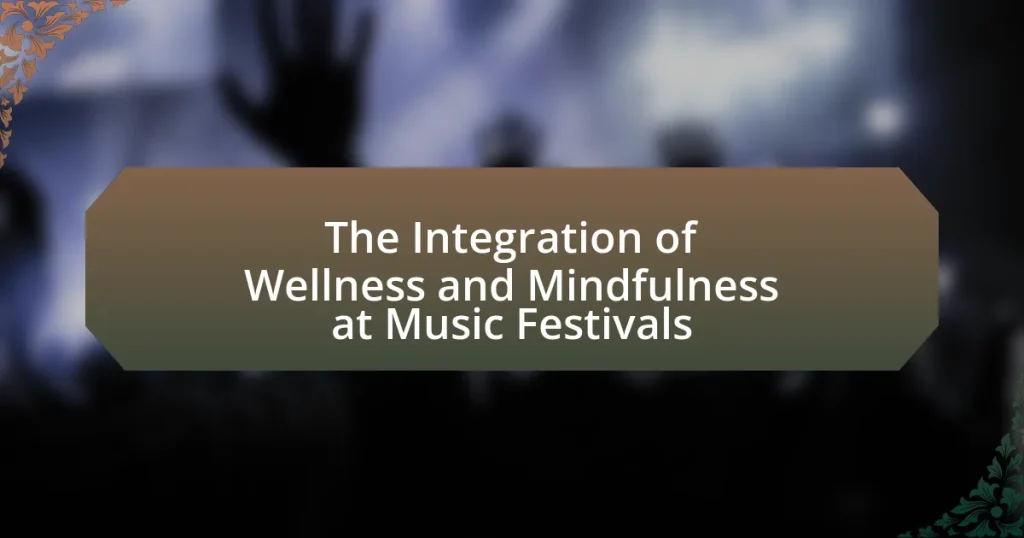The integration of wellness and mindfulness at music festivals focuses on enhancing attendees’ mental, emotional, and physical well-being through various practices and activities. Key offerings include yoga sessions, meditation spaces, wellness workshops, and healthy food options, which collectively aim to reduce stress and improve mood. Research supports the effectiveness of these initiatives, indicating that mindfulness practices can significantly enhance emotional well-being and foster a sense of community among festival-goers. The article explores how festival organizers can effectively implement these wellness initiatives, the benefits for attendees, and the challenges faced in integrating such concepts into the festival experience.

What is the Integration of Wellness and Mindfulness at Music Festivals?
The integration of wellness and mindfulness at music festivals involves incorporating practices and activities that promote mental, emotional, and physical well-being among attendees. This integration is evident through offerings such as yoga sessions, meditation spaces, wellness workshops, and healthy food options, which aim to enhance the overall festival experience. Research indicates that such initiatives can reduce stress and improve mood, contributing to a more positive atmosphere. For example, a study published in the Journal of Positive Psychology found that mindfulness practices can significantly enhance emotional well-being, supporting the effectiveness of these wellness initiatives at festivals.
How does the concept of wellness manifest in music festivals?
The concept of wellness manifests in music festivals through various holistic practices and environments that promote mental, physical, and emotional well-being. Many festivals incorporate wellness activities such as yoga sessions, meditation workshops, and wellness panels, which encourage attendees to engage in self-care and mindfulness. For instance, festivals like Coachella and Bonnaroo have introduced wellness areas featuring guided meditation and relaxation spaces, highlighting the importance of mental health in the festival experience. Additionally, the presence of healthy food options and hydration stations further supports physical wellness, catering to the nutritional needs of festival-goers. This integration of wellness practices not only enhances the overall festival experience but also fosters a community focused on health and mindfulness.
What activities promote wellness at these events?
Activities that promote wellness at music festivals include yoga sessions, meditation workshops, and wellness panels. These activities are designed to enhance mental and physical well-being, providing attendees with tools to manage stress and cultivate mindfulness. For instance, studies have shown that yoga can reduce anxiety and improve mood, while meditation has been linked to increased focus and emotional regulation. Additionally, wellness panels often feature experts discussing topics related to health, nutrition, and self-care, further supporting the overall wellness theme at these events.
How do festival organizers incorporate wellness into their planning?
Festival organizers incorporate wellness into their planning by integrating activities and spaces that promote physical and mental health. They often include yoga sessions, meditation areas, and wellness workshops to encourage relaxation and mindfulness among attendees. Additionally, organizers may provide healthy food options, hydration stations, and quiet zones to enhance the overall well-being experience. Research indicates that such initiatives can significantly improve attendee satisfaction and engagement, as seen in festivals like Coachella and Bonnaroo, which have successfully implemented wellness programs to foster a holistic festival environment.
Why is mindfulness important in the context of music festivals?
Mindfulness is important in the context of music festivals because it enhances the overall experience by promoting presence and emotional well-being. Engaging in mindfulness practices allows attendees to fully immerse themselves in the music and atmosphere, reducing anxiety and stress often associated with large crowds. Research indicates that mindfulness can improve emotional regulation and increase enjoyment, which is particularly beneficial in the dynamic and often overwhelming environment of a festival. For instance, a study published in the Journal of Positive Psychology found that mindfulness practices can lead to greater life satisfaction and reduced negative emotions, supporting the idea that being present at a music festival can enhance enjoyment and connection to the experience.
What practices are commonly used to promote mindfulness at festivals?
Common practices used to promote mindfulness at festivals include guided meditation sessions, yoga classes, and mindfulness workshops. These activities are designed to help attendees connect with themselves and their surroundings, fostering a sense of presence and awareness. For instance, many festivals offer designated quiet areas where participants can engage in meditation or reflective practices, allowing them to step away from the sensory overload typical of such events. Additionally, some festivals incorporate sound healing sessions or nature walks, which further enhance the mindfulness experience by encouraging participants to engage with their environment in a calm and intentional manner.
How does mindfulness enhance the overall festival experience?
Mindfulness enhances the overall festival experience by promoting present-moment awareness, which allows attendees to fully engage with the music, art, and community around them. This heightened awareness can lead to increased enjoyment and satisfaction, as individuals are more likely to appreciate the sensory elements of the festival, such as sounds, sights, and interactions. Research indicates that mindfulness practices can reduce stress and anxiety, enabling festival-goers to feel more relaxed and open to new experiences. For instance, a study published in the Journal of Happiness Studies found that mindfulness significantly correlates with increased life satisfaction and emotional well-being, which can translate to a more fulfilling festival experience.

What are the benefits of integrating wellness and mindfulness at music festivals?
Integrating wellness and mindfulness at music festivals enhances attendee experience and promotes mental health. This integration provides a space for relaxation and self-reflection, which can reduce stress and anxiety levels among festival-goers. Research indicates that mindfulness practices, such as meditation and yoga, can lead to improved emotional regulation and increased feelings of well-being. For instance, a study published in the Journal of Happiness Studies found that participants engaging in mindfulness activities reported a 30% increase in overall happiness and a significant decrease in stress levels. Additionally, incorporating wellness activities fosters a sense of community and connection among attendees, enhancing social interactions and overall enjoyment of the festival experience.
How does this integration impact attendees’ mental health?
The integration of wellness and mindfulness at music festivals positively impacts attendees’ mental health by reducing stress and enhancing overall well-being. Research indicates that mindfulness practices, such as meditation and yoga, can lower anxiety levels and improve emotional regulation. For instance, a study published in the Journal of Happiness Studies found that participants who engaged in mindfulness activities reported a significant decrease in stress and an increase in life satisfaction. This suggests that incorporating wellness initiatives at music festivals can create a supportive environment that fosters mental health, allowing attendees to enjoy the experience more fully.
What evidence supports the mental health benefits of mindfulness at festivals?
Mindfulness at festivals has been shown to provide significant mental health benefits, supported by various studies. Research indicates that mindfulness practices can reduce anxiety and depression, enhance emotional regulation, and improve overall well-being. For instance, a study published in the Journal of Positive Psychology found that participants who engaged in mindfulness activities reported lower stress levels and increased feelings of happiness during festival settings. Additionally, a survey conducted at music festivals revealed that attendees who practiced mindfulness techniques, such as meditation and breathing exercises, experienced heightened states of relaxation and connection with others, contributing to improved mental health outcomes. These findings collectively underscore the positive impact of mindfulness on mental health in the context of festivals.
How do wellness activities contribute to stress reduction for festival-goers?
Wellness activities contribute to stress reduction for festival-goers by promoting relaxation and mindfulness, which can alleviate anxiety and enhance overall well-being. Engaging in activities such as yoga, meditation, and guided breathing exercises helps individuals manage stress responses, leading to lower cortisol levels. Research indicates that mindfulness practices can significantly reduce stress and improve emotional regulation, as evidenced by a study published in the Journal of Happiness Studies, which found that participants who practiced mindfulness reported a 30% decrease in perceived stress levels. Thus, the incorporation of wellness activities at music festivals serves as an effective strategy for enhancing the mental health of attendees.
What positive effects does this integration have on community building?
The integration of wellness and mindfulness at music festivals fosters stronger community bonds and enhances social connections among attendees. This integration encourages shared experiences, such as group meditation or yoga sessions, which promote a sense of belonging and collective well-being. Research indicates that participation in wellness activities can lead to increased social cohesion, as individuals engage in meaningful interactions and support one another in a relaxed environment. For instance, a study published in the Journal of Community Psychology found that communal activities significantly improve interpersonal relationships and community trust, reinforcing the positive impact of wellness integration on community building at music festivals.
How do wellness and mindfulness foster connections among attendees?
Wellness and mindfulness foster connections among attendees by creating shared experiences that promote emotional openness and vulnerability. When participants engage in wellness activities, such as yoga or meditation, they often find themselves in a relaxed state, which encourages authentic interactions. Research indicates that mindfulness practices can enhance empathy and social bonding, as demonstrated in a study published in the journal “Psychological Science,” where participants who practiced mindfulness reported greater feelings of connection with others. This collective engagement in wellness activities at music festivals not only enhances individual well-being but also cultivates a sense of community among attendees, reinforcing social ties and shared values.
What role does shared experience play in enhancing community at festivals?
Shared experience plays a crucial role in enhancing community at festivals by fostering connections among attendees. When individuals participate in collective activities, such as music performances or wellness workshops, they create shared memories that strengthen social bonds. Research indicates that shared experiences can lead to increased feelings of belonging and trust within a group, which is essential for community building. For instance, a study published in the Journal of Community Psychology found that communal activities at events significantly enhance participants’ sense of community and social cohesion. This evidence supports the idea that shared experiences are fundamental in cultivating a vibrant and interconnected festival community.

How can music festivals effectively implement wellness and mindfulness initiatives?
Music festivals can effectively implement wellness and mindfulness initiatives by incorporating designated relaxation zones, offering guided meditation sessions, and providing workshops focused on mental health. These initiatives create a supportive environment that encourages attendees to engage in self-care practices. For instance, festivals like Coachella and Bonnaroo have successfully integrated yoga classes and mindfulness workshops into their schedules, which have been shown to enhance the overall festival experience and promote emotional well-being among participants. Research indicates that such activities can reduce stress and improve mood, making them valuable additions to the festival experience.
What strategies can organizers use to promote wellness and mindfulness?
Organizers can promote wellness and mindfulness by incorporating activities such as yoga sessions, meditation workshops, and wellness booths at music festivals. These activities provide attendees with opportunities to engage in physical and mental relaxation, fostering a holistic approach to well-being. Research indicates that yoga and meditation can reduce stress and enhance emotional health, making them effective tools for promoting mindfulness. Additionally, offering healthy food options and creating quiet spaces for reflection can further support attendees’ wellness journeys, as studies show that nutrition and environment significantly impact mental health.
How can partnerships with wellness professionals enhance festival offerings?
Partnerships with wellness professionals can significantly enhance festival offerings by providing specialized activities that promote physical and mental well-being. These collaborations can introduce yoga sessions, meditation workshops, and holistic health consultations, which cater to the growing demand for wellness experiences among festival-goers. Research indicates that 78% of festival attendees express interest in wellness activities, highlighting the potential for increased engagement and satisfaction. By integrating wellness professionals, festivals can create a more balanced atmosphere, encouraging attendees to recharge and connect with themselves, ultimately leading to a more enriching overall experience.
What types of workshops or sessions can be included in the festival schedule?
The festival schedule can include various types of workshops or sessions focused on wellness and mindfulness, such as yoga classes, meditation sessions, sound healing workshops, and nutrition seminars. These activities are designed to promote mental and physical well-being among attendees. For instance, yoga classes can enhance flexibility and reduce stress, while meditation sessions can improve focus and emotional health. Sound healing workshops utilize sound frequencies to promote relaxation and healing, and nutrition seminars educate participants on healthy eating habits. Such offerings align with the growing trend of integrating wellness practices into music festivals, as evidenced by events like the Coachella Music Festival, which has incorporated wellness spaces and activities in recent years.
What challenges might festivals face in integrating these concepts?
Festivals may face significant challenges in integrating wellness and mindfulness concepts due to logistical constraints, audience engagement, and resource allocation. Logistically, festivals must create dedicated spaces for wellness activities, which can be difficult to accommodate within existing festival layouts. Audience engagement poses another challenge, as not all attendees may be interested in wellness activities, leading to potential underutilization of resources. Additionally, securing qualified instructors and facilitators for mindfulness practices can strain budgets and complicate scheduling. These challenges highlight the complexities involved in effectively incorporating wellness and mindfulness into the festival experience.
How can organizers overcome resistance to wellness initiatives?
Organizers can overcome resistance to wellness initiatives by actively engaging participants in the planning process. Involving attendees in discussions about wellness offerings fosters a sense of ownership and increases buy-in. Research indicates that when individuals feel their opinions are valued, they are more likely to support initiatives; for example, a study published in the Journal of Health Promotion found that participatory approaches significantly enhance program acceptance and participation rates. Additionally, providing clear communication about the benefits of wellness initiatives, such as improved mental health and enhanced festival experiences, can further reduce resistance.
What logistical considerations must be addressed for successful implementation?
Successful implementation of wellness and mindfulness integration at music festivals requires addressing several logistical considerations, including space allocation, resource availability, and scheduling. Space allocation is critical as designated areas must be created for wellness activities, ensuring they are accessible yet separate from main festival activities to minimize distractions. Resource availability involves securing qualified instructors and materials for mindfulness practices, such as yoga mats and meditation guides, which are essential for participant engagement. Scheduling is also vital; wellness sessions should be strategically timed to avoid conflicts with major performances, allowing attendees to participate without missing key events. These considerations are supported by successful case studies from festivals that have effectively integrated wellness programs, demonstrating increased attendee satisfaction and engagement.
What are some best practices for attendees to engage in wellness and mindfulness at festivals?
Attendees can engage in wellness and mindfulness at festivals by participating in structured activities such as yoga sessions, meditation workshops, and guided nature walks. These activities promote mental clarity and physical well-being, allowing individuals to connect with themselves and their surroundings. Research indicates that mindfulness practices, such as meditation, can reduce stress and enhance overall happiness, which is particularly beneficial in the high-energy environment of festivals. Additionally, attendees should prioritize hydration, healthy eating, and adequate rest to maintain their physical health, as these factors significantly contribute to one’s ability to engage mindfully in the festival experience.
